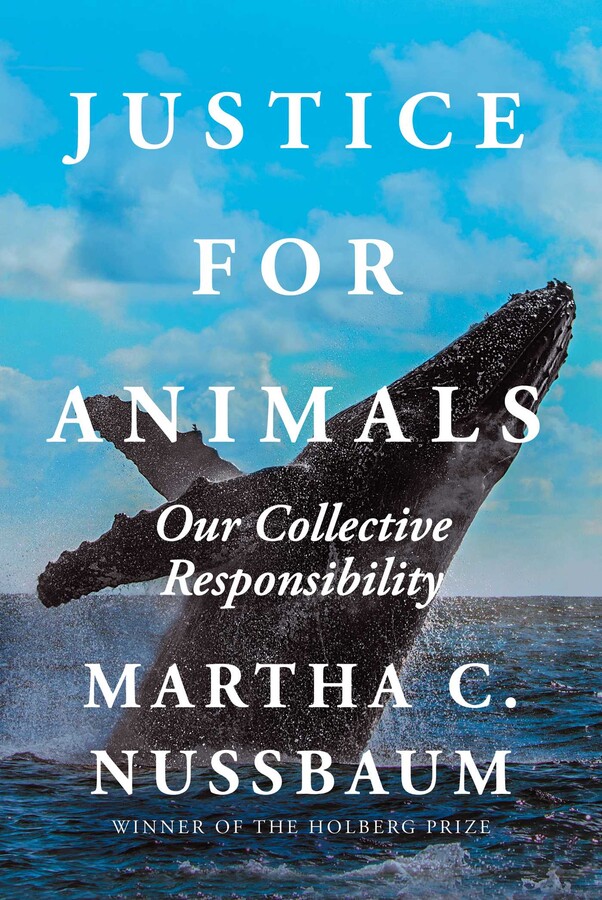‘There is no reason why animals cannot have legal standing’
In interview with Kathimerini, American philosopher and author calls for better justice for nonhuman species

How would you feel about litigation with parties representing animals, or banning industrial animal husbandry in favor of less brutal forms of producing meat, such as growing it in a lab? Martha Nussbaum, professor of law and ethics at the University of Chicago, concerned with the inequality in human-animal relations and the violation of animal rights, presents a radical, and to some “provocative,” viewpoint through her work “Justice for Animals: Our Collective Responsibility.”
Influenced by the systematic injustice and abuse suffered by animals, the multi-award-winning philosopher Nussbaum (Holberg Prize, 2021) reinterprets the relationship between sentient and non-sentient beings.
In her book, through a political-philosophical analysis, human beings, as the tyrants of the animal kingdom, must acknowledge their responsibilities and redefine their role toward animals.
Kathimerini interviewed Dr Nussbaum in a discussion about the injustices suffered by animals, the ancient Greek origin of animal ethics, and how the international community should take a more active role toward countries that violate international regulations.
Your work often intersects with political philosophy and ethics. Most of your books examine questions of morality and justice in human lives. Your new work, “Justice for Animals,” examines the injustices animals suffer at the hands of humans. What led you to touch on the sensitive subject of human-animal relationships?
All my work is political philosophy and ethics, it does not just intersect with it. I addressed injustice to animals already in my 2006 book “Frontiers of Justice,” and after that, I began to write a series of co-authored articles with my daughter, who, until her death, was a lawyer for animal rights. We presented our work at the Human Development and Capability Association. I then decided I should write an entire book on this topic. My daughter’s legal work for wild animals inspired me. After her tragically premature death in 2019, from a fungal infection after surgery, I was determined to finish it and make it worthy of her life and what she stood for. It is one of the most urgent topics of our time.
Several Western countries have not adopted animal welfare laws, while in many developing nations animals are considered a tool for their work. Living among societies with different perceptions of animal rights, how can we modernize animal-human relations and where should modernization start (e.g. education systems)?
Well, you need to know that the Western countries have been behind many if not most non-Western countries on this topic. The countries in which animals have legal standing (can act as plaintiffs in legal actions, represented by a guardian) are: India, Colombia, Ecuador, Pakistan and Argentina. The Buddhist tradition has been pro-animal since the lifetime of the Buddha, and about half of the Indian people eat no meat. Although the Western tradition had some strong pro-animal voices very early on – the late Greek Platonists Porphyry and Plutarch – that tradition soon turned away from animals, and no strong voice for animals appeared until Jeremy Bentham in the 18th century.
As for animal welfare laws, all Western countries have some, but typically they protect companion animals, not animals we eat. The factory farming industry has enormous power in US politics, preventing reform. Thus, we have laws protecting not just companion animals but also birds (but not the ones we eat) and marine mammals, but no protection at all for cows, pigs and chickens at the national level, though individual states have introduced restrictions. Europe is far better, with ample restrictions on the industry; Austria and Sweden are leaders.
‘We need to challenge the factory farming industry aggressively by informing the public of conditions in that industry’
In general, we need to work on many fronts. To protect marine mammals, we need laws against single-use plastic, laws regulating lobster-fishing gear, laws regulating noise pollution in the ocean, and of course, laws outlawing harpooning. My recent long article in The New York Review of Books goes into all this. Domestically, we need to challenge the factory farming industry aggressively by informing the public of conditions in that industry. Fortunately, now we have meat substitutes: artificial plant-based meat is very popular, and meat grown from stem cells is beginning to be available. So, the industry is vulnerable and may begin to make concessions.
In your book, you refer to Aristotle’s views on animal ethics. Aristotle introduced “telos” to explain that animals have purposes and created a hierarchy in which humans are the boss and animals follow. Judging that Aristotle was the first to write about ethical considerations in the use of animals, how have these views influenced your work and where do you draw your key distinctions?
No! One of the great lies in the history of philosophy is the idea that Aristotle created the “scala naturae,” the hierarchy you speak of. That idea is from medieval Christian Aristotelianism and is nowhere in Aristotle. Aristotle insisted on focusing on what all animals have in common and created what he called a “common explanation” of how animals move toward their objects of desire. All this was in his small treatise “On the Movement of Animals (De Motu Animalium),” on which I wrote my dissertation. He was not the first either: Several of the Pre-Socratics were concerned with animals. My key distinction is between sentient animals (those who have a subjective perspective on the world, who feel pain and pleasure) and others. This distinction was not available to Aristotle because finding out which animals feel pain requires advanced research that has been done only recently.
In your book, you reject industrial animal husbandry and focus on non-brutal farming. With close to 8 billion citizens on Earth and considering the widespread nutritional needs, many will claim that “quality” farming will create food shortages. How can the ethical question you raise coexist with the ever-increasing food needs?
Human beings do not need meat to survive. Our species evolved as herbivores who ate meat occasionally on ceremonial occasions. Meat is a pretty unhealthy food for humans, and health reasons alone have convinced many people to adopt a plant-based diet. The meat industry also is one of the major contributors to global warming, which is bad for everyone’s health. However, people who are terribly attached to meat can now choose lab-grown meat that does not involve raising and killing animals.
In the US we see that many law graduates delve into animal law and pursue a career as animal lawyers. How close or far away are we from the time when animal trials will be held in the courts or when such cases will end up in the Supreme Court? And if such a prediction is realistic, will human utilitarianism stand in the way of real justice?
You overestimate the number of law graduates who choose these careers. My daughter’s salary was very low, working for an NGO on animal issues, and most graduates choose higher salaries. However, even then they can do good work for animals through pro bono projects within large law firms. I think the main emphasis has to be on passing good laws at the state level, with California taking the lead. But as legal experts have insisted for some time, there is no reason why animals cannot have legal standing. The problem is that our Congress would not do that, and without statutory backing, courts are unlikely to go there. The most creative pro-animal court decisions have involved the interpretation of a good statute, such as the Marine Mammal Protection Act or the Migratory Bird Treaty Act.
As for utilitarianism – if you mean the views of Bentham and [John Stuart] Mill, that would be huge progress, since they thought the right choice is one that maximized welfare for all sentient beings, including animals. If you mean simple greed, I think young people are different and are really caring about the whole planet.
To recapitulate, I was struck by the chapter on whales and the weaknesses of international law, and you mention that our legal systems are in a primitive state with regard to animal life. What messages are you seeking to convey to the international community and what changes do you expect to achieve in the near future?
For the near future, nations must do the work, but this is not terribly helpful for marine mammals. We need international laws that are genuinely enforceable. Right now, nations that do not like what the international group that regulates whaling is doing can just quit their membership. We need to be able to hold nations such as Japan and Norway, two major offenders, accountable. Since the World Court deals only with violations of the treaty by member-nations, that will not work. What might work is diplomatic pressure by more concerned nations. Above all, the pressure of public opinion is crucial and has already caused Iceland, which used to hunt a lot of whales, to reduce its numbers, and I think there are signs of a similar trajectory in Japan. I hope what I write may make a difference.






